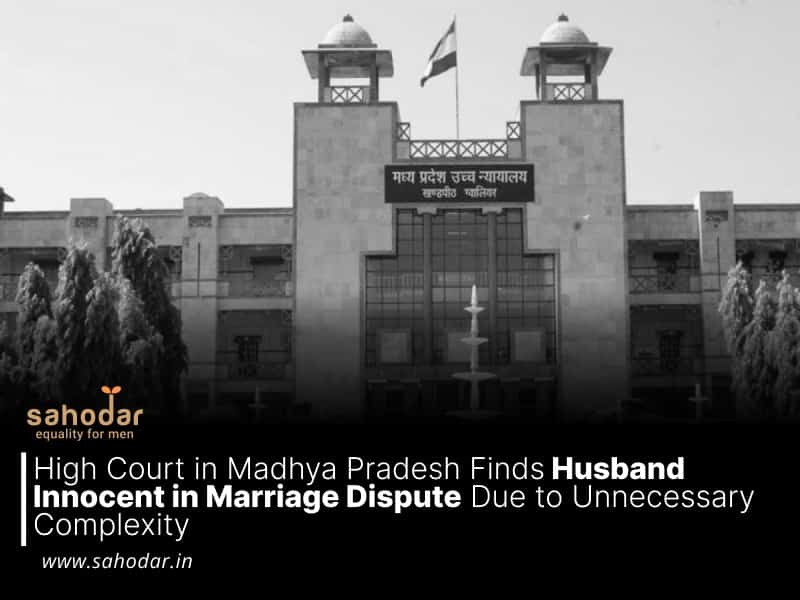Based on the concord reached between the matrimonial partners, the Madhya Pradesh High Court invoked its jurisdiction under Section 482 of the Code of Criminal Procedure (CrPC) to abate the pending criminal case against the husband.
“If compromise between husband and wife is effectuated by the attempts of their family members, it will not only be good for society but also beneficial for their remaining life. The object of compromise is to settle down. The object of compromise is to settle in life and live peacefully”, the court noted while disposing of the matter.
In a solitary judicial capacity, Justice Prem Narayan Singh underscored the intricate and multifaceted nature of the law, which extends beyond punitive actions to encompass the preservation of peace, tranquility, and societal harmony. Furthermore, the court opined that fostering compromise in matrimonial disputes represents a judicious strategy for circumventing the protracted temporal dimension inherent in protracted legal proceedings.
Regarding the circumstances of this particular case, wherein the husband and wife have amicably resolved their differences and willingly chosen to live separately, the court placed added emphasis on the potential adverse consequences stemming from an excessively strict and hyper-technical interpretation of their agreement.
“…therefore, hyper-technical view regarding the compromise can be counterproductive and against the interest of the woman and against the pious object for which the disputes between husband and wife have been settled, because in case the criminal proceedings are still permitted to continue then fresh series of dispute may start between the wife and the members of the family of her husband”, the bench sitting at Indore remarked.
In the process of quashing the criminal proceedings, the court conducted a comprehensive analysis of judicial precedents, notably drawing upon the cases of Gian Singh v. State of Punjab and Anr. (2012) and B. S. Joshi v. State of Haryana (2003). This meticulous scrutiny culminated in the determination that the inherent jurisdiction vested in the High Court under Section 482 of the Code of Criminal Procedure (CrPC) is not circumscribed by the confines of Section 320 of the CrPC, which predominantly governs the compounding of offenses.
Of specific relevance, the Gian Singh case elucidated that the authority conferred upon the High Court by Section 482 of the CrPC operates autonomously, independently from the statutory provisions of Section 320 of the CrPC.
“…Inherent power is of wide plenitude with no statutory limitation but it has to be exercised in accord with the guidelines engrafted in such power viz; (i) to secure the ends of justice or (ii) to prevent abuse of the process of any Court”, a three-judge bench of Supreme Court opined while also adding that the decision to quash an FIR in matters where the offender and the victim have reached a settlement will depend on facts and circumstances of each case.
As highlighted in the Gian Singh case, the supreme court emphasized the differential treatment of cases with significant resemblances to civil matters when it pertains to their dismissal. Furthermore, the court categorized offenses associated with matrimonial matters, such as dowry disputes and family conflicts, as falling within the category of cases primarily addressing personal and private issues.
“…In this category of cases, High Court may quash criminal proceedings if in its view, because of the compromise between the offender and victim, the possibility of conviction is remote and bleak and continuation of the criminal case would put the accused to great oppression and prejudice and extreme injustice would be caused to him by not quashing the criminal case despite full and complete settlement and compromise with the victim”, the apex court had observed back in 2012.
Background: The petitioners were facing charges under various sections of the Indian Penal Code (IPC) and the Dowry Prohibition Act as per a filed complaint. Their marital discord originated in 2018. The wife, who lodged the complaint, alleged harassment by her husband’s family over trivial matters. Additionally, she contended that her family had financially facilitated her husband’s acquisition of an Australian visa, which he did not utilize for her benefit.
In the High Court, the petitioners asserted that they had already obtained a divorce through an Australian court and perceived the filed complaint as a vexatious tactic aimed at troubling the husband and his family.
Subsequently, both parties jointly applied for the quashing of charges under relevant legal provisions, which the High Court diligently reviewed and approved. The petitioners argued that continuing the criminal case in the lower court would be a futile exercise. Moreover, they mutually consented not to initiate any further legal proceedings pertaining to their marriage. Following the formalization of their agreement, the wife independently approached the High Court to seek the discontinuation of the ongoing criminal case at the trial court.

